Super bad
It took a lot of working out the context in my mind, but I’m finally ready to look at a very interesting species of comics villain.
It starts from the issue I raised in Super, thanks for asking, which is that Superman isn’t there. The substance named “Superman is” presumed, rather than exemplified, particularly in comics, in part because so much of his cultural identity was formed on TV. Most comics stories about him show how he’s deviated from this ineffable “is,” rather than depicting him straightforwardly being and doing it. Thus the “is,” although rarely or never seen, is defined by how a given usage either almost gets it, with the degree thereof hotly debated among the fanbase, or shows a distinct lapse from it as a plot point.
You can take this approach out of his skin, too, via a character who isn’t him … or, in the dodgy sense I’m using the term, “is.” It seems to me that this technique is practically obligatory; it demands to be done, in order to show the “is” by a very dedicated, dramatic “isn’t.” And I’ll get right to the most extreme form, all the way into villain territory, which has a rich history.
The originator is probably Hyperion, the “take that Supes” guy at Marvel, introduced as an Avengers antagonist by Roy Thomas and Sal Buscema all the way back in 1968. I first encountered him in the Defenders in 1974 (Steve Englehart, still with Sal), and also in the Avengers (with Englehart and George Perez, as discussed in And the horse you rode in on). There have been lots of versions and twisty-turns in his concept since then, to the extent that he’s a meta-text on his own, but for now let’s stay with the basic form.
Hyperion’s trappings are identical with Superman’s:
- An alien origin yet entirely human appearance tilted toward “ideal human”
- Modification: Hyperion began distinctly more thuggish-looking; different renditions have played with this
- Strong institutional ties, whether representing a government or allied to a group of superheroes who are thought of as society’s protectors
- Unquestionably superior powers compared to his teammates and to the general “level” of super-powered effectiveness in the story
So what’s the difference? Obviously, it’s that Hyperion is an asshole, but crucially, he’s just an asshole. The concept really doesn’t need a special psychological condition or justification; in fact, I think that would fatally detract from the point. Think about this with me: in order for Superman to be maximally villainous, what he really needs is the ordinary human degree of temper, pettiness, ego, and conflicted politics.
 That’s a damn impressive notion. It’s a straight-up counter-strike to the presumed, or widely-stated idea that what makes Superman a hero is his humble and decent upbringing by salt-of-the-earth small-town Americans. Most of the examples in the rest of this post go in other ways, investigating other variables, but this one is the whole underpinning concept of Strong Female Protagonist.
That’s a damn impressive notion. It’s a straight-up counter-strike to the presumed, or widely-stated idea that what makes Superman a hero is his humble and decent upbringing by salt-of-the-earth small-town Americans. Most of the examples in the rest of this post go in other ways, investigating other variables, but this one is the whole underpinning concept of Strong Female Protagonist.
The tagline of the series is the adventures of a young middle-class American with super-strength, invincibility and a crippling sense of social justice. One doesn’t have to oppose ideals of social justice to see that the implications are pretty rough, and they have played out harshly at every step, even page by page. It’s not a sweet li’l comic about how a nice progressive millenial is just the right superhero to show the bad people a thing or two. Alison was never a very nice person – she only wants to be, and that can end … badly. Click the page to see the final dialogue. It’s not a throwaway line; everything in the story beforehand leads to that admission, and everything since has proceeded from her having said it.
Check out the three-page sequence beginning with this one to see where it’s gone by the time of this writing. Also see the comments, where cries of “no you’re writing her wrong” compete with the enthusiastic cries of encouragement for her to abuse anyone whose politics differ from hers, or rather, as those particular readers conceive of them.
Back to the historical view. I don’t know why it took so long for the Super Bad concept to receive dedicated attention, but once it did, look out!
I see Alan Moore’s role in all this not to be the ruthless deconstructer, but rather the ever-faithful lover re-discovering and seeking to express his devotion. I’m with this guy: for what other imaginable reason would someone, having already done two thoughtful, questioning takes on Superman as well as Miracleman, pick up and “fix” Liefeld’s misbegotten Supreme? Whatever his “is” is, for Superman, even after all these years and versions and multi-layered depictions, it is as much an unspoken and perhaps unknowable gestalt as ever, not a textual entity at all.
Here’s also a key topic of reflection different from that offered by Hyperion, best seen in the Public Spirit (as discussed in Looking for a hero), Miracleman to some extent, Maximortal, and possibly Doctor Manhattan. For whom the crucial topic is the idealism that’s invested in the character by the public, corresponding directly to the cynical uses he’s put to by political powers. Veitch takes it up to 11, especially since Maximortal is “gone missing” in Bratpack, meaning, his absence is more story-powerful than his presence.
Another perfectly viable avenue of critique is to go all the way into gorn. Yes, yes, it’s dark, edgy, sinister … but c’mon, there’s obviously a certain satisfaction to be gained from drawing Superman um, I mean, this guy squishing people’s heads and ripping people’s guts out while not even the superheroes can stop him. The interesting thing is that – I think – this is not the automatic villain-tag that the original Hyperion’s basic, quite ordinary assholery is. You can see the Hideously Violent but not Gone All Wrong perfectly in Apollo (Wildstorm Comics, The Authority).
By the 2000s, these variables are now established, so the rep/expectations issue gets a new workout with Supershock, and the human-values vs. alien-identity hits a particularly gory high note with Omni-Man. The latter also brings in the stress of romance and kin – Invincible is practically defined by “what if Superboy is Superman’s son?”
Remember how I said Hyperion evolved his own within-Marvel meta-text, with various versions of the character from different dimensions, different “takes” depending on the writer, and so on? This happens for any of these characters if he’s around long enough. In other words, an attempt at defining a particular take on Superman is primed to explode into fractals.
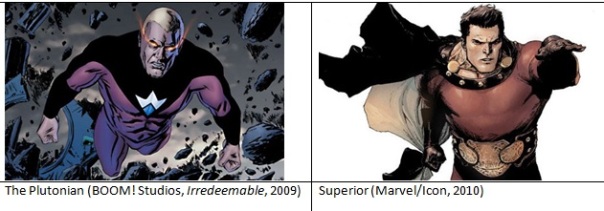 Here’s a tricky concept: that villainizing Superman relies on either dehumanizing or humanizing him. It gives me a hint into the primal tension of the concept: is he extra human or inhuman? Does he need to “learn to love” from mere humans, like those ubiquitous oh-so-advanced energy-beings in Star Trek? Or do humans need to take a page from his book, as he tolerates our frailties? Or is he “too good for this sinful earth” and no matter what he does, we’re too broken to be helped?
Here’s a tricky concept: that villainizing Superman relies on either dehumanizing or humanizing him. It gives me a hint into the primal tension of the concept: is he extra human or inhuman? Does he need to “learn to love” from mere humans, like those ubiquitous oh-so-advanced energy-beings in Star Trek? Or do humans need to take a page from his book, as he tolerates our frailties? Or is he “too good for this sinful earth” and no matter what he does, we’re too broken to be helped?
 That point also explains the non-villainous expys whom I like the most: in addition to Apollo, that’s Victor in Hero Alliance (see Striking twice, someday), Epoch in Magellan, and Captain Ultimo in Supervillainous. Regardless of their elevated power/status above other super-characters, regardless of their special social status, all of them are blessedly normal in their passions and frustrations, and manage to keep it together to be admirable anyway. However, all of them also need a hefty dose of in-fiction presumption that they do enough unmitigated good to matter, without showing it in action.
That point also explains the non-villainous expys whom I like the most: in addition to Apollo, that’s Victor in Hero Alliance (see Striking twice, someday), Epoch in Magellan, and Captain Ultimo in Supervillainous. Regardless of their elevated power/status above other super-characters, regardless of their special social status, all of them are blessedly normal in their passions and frustrations, and manage to keep it together to be admirable anyway. However, all of them also need a hefty dose of in-fiction presumption that they do enough unmitigated good to matter, without showing it in action.
Dehumanizing him seems to be the more common source of villainy throughout the characters I’ve pictured, whether emphasizing his literally-alien origins, his alienated or delusional origins, his “you can’t understand me” perspective based on his powers, or certain meta-fictional qualities that literally place him in a different reality from other people.
Call me cynical but I think the Hyperion concept is more critically accurate. Without that in-fiction presumption, the more identifiably human Superman is, the more understandably he becomes a bad guy.
Think about it a bit. What’s your Super Bad like?
Links: TV Tropes did a good job with this one – consider the interfaces among Expy, Captain Ersatz, and Beware the Superman
Note: I obviously left out the various edgy versions of DC’s version of Fawcett’s Captain Marvel – too complicated, as discussed in my previous column. I also put aside the heroic stand-ins permitted a tad of ambiguity, like the Martian Manhunter at DC, Gladiator at Marvel, and Apollo at Wildstorm. Honorable mention goes to Icon (Milestone, Icon, 1993), who’s Superman as upwardly-mobile American black guy with conservative politics, for which I appreciate the precise humor.
Next comics: Sword of God, Friends, p. (October 25), One Plus One, Two, p. (October 27)
Next column: Two women (October 30)
Posted on October 23, 2016, in Lesser is still great, The great ultravillains and tagged Alan Moore, Alpha One, beware the superman, Blue Marvel, Captain Ersatz, DC Comics, Eradicator, expy, George Perez, Hyperion, Maximortal, Miracleman, Mr. Majestic, Omni-Man, Oodles of titles, Plutonian, Public Spirit, Roy Thomas, Sal Buscema, Sentry, Steve Bissette, Steve Englehart, Strong Female Protagonist, Superior, Superman, Supreme, Titan. Bookmark the permalink. 19 Comments.
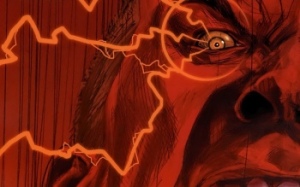
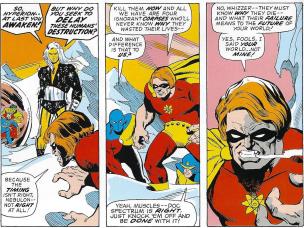
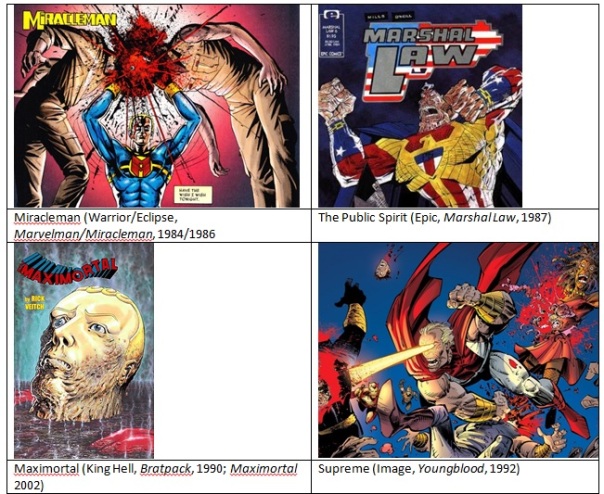
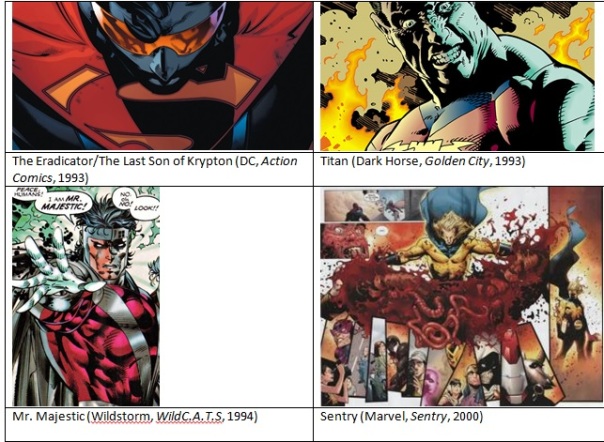
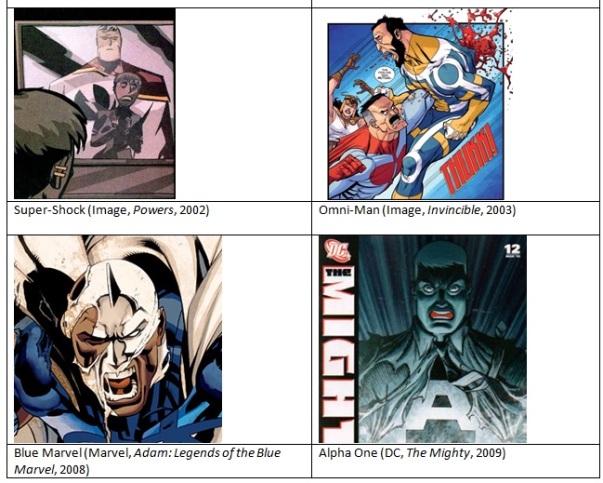

Best!
I’m going through my mental checklist and holy crap, for once you hit all of them! Does this mean you finally actually read Irredeemable? Thoughts?
I love love love how complicated and complex SFP is right now. I legit don’t know how to feel about her actions, despite having put myself in her shoes innumerable times in daydreams throughout my life.
Great stuff, keep it coming!
Also now read Jupiter’s Legacy (although maybe wait until it’s finished because holy crap is Millar taking his damn time)
Also also have you read any Luna Brothers stuff? Ultra, Girls, The Sword, all top notch stories with plenty of dirty brain stuff to chew on but maybe not easily digest.
Also also also have you read Brandon Graham’s run on Prophet yet? It’s super right up your alley.
I realize me giving you reading suggestions is ridiculous given how much more broadly read you obviously are than I, but it’s my nature and I can’t help it.
LikeLike
Shotgun blast! Can’t … evade …
1. I’ve been following Prophet all along. I like it although it’s very far into what I think of as the cold-and-dour European school of Cosmic Zap.
2. I’m working my way slowly among some of your recommendations, both here and elsewhere. This particular series of posts on Superman have already led me to read things I’d otherwise not been interested in, so that will continue.
3. I’m pretty sure that if I let loose about my thoughts on SFP, I’d get lynched by the fanbase. It seems almost impossible to locate any exchange of comments there, for instance, which can focus on the actual events rather than on a given reader’s assignment of powers, character motivation, and author intention. I’d love to discuss this story with someone some time, if I can find anyone who’s actually been reading it.
I choose you! Let me start by saying I consider all of the following to be good writing. It’s not an attack on the comic.
Let’s take the events starting when Alison finds out what Feral’s doing in the hospital. For those not following along, Feral is basically Wolverine, who’s decided to undergo organ-removal surgery almost 24/7, without anesthetic since it doesn’t work on her, in order to provide for patients (her tissues are 100% receiver-compatible). She explicitly frames it as a repudiation of “put on mask, fight crime” as the right/heroic thing to do with your superpowers.
i) Feral lies to Alison, or rather, withholds key information. She doesn’t want her to know.
ii) Alison finds out about it via Patrick’s telepathy, without Feral’s knowledge or consent.
iii) In going to talk Feral out of it, she crosses paths with a foreign teleporter who also wants to talk Feral out of it. She attacks him at first sight for absolutely no reason and then, during the three-way discussion, apparently deeply resents anyone being Feral’s friend save for herself. She even goes nigh-berserk when the guy agrees with her and attacks him lethally, which he escapes.
iv) When the “no freak organs” protesters show up and one of them blasts Feral with a flamethrower, Alison kills the guy and almost starts laying into the crowd. However, the attack doesn’t work, Feral survives, which has nothing to do with Alison’s actions, and Alison only relents from killing them all because Feral talks her down.
v) She has had no, zero direction interaction with Feral until very recently (like, last week). In the interim, she holds up Feral as a paragon of altruistic self-sacrifice and is furious at the person who suggests otherwise.
vi) She did not inform Feral that she would boost her powers, or about the degree of coercion she used to get the “super booster” to do it. This brings us up to the current week so (a) we still don’t quite know the details of how the boosting worked, not that it matters much; and (b) there’s no way to know for this writing whether Feral will learn this, what she will think of it, which very much does matter.
it’s the straightforward plot, based only on observed reactions and actions: Alison has played this entire situation dishonestly toward Feral from the start, not to mention displaying seriously irrational reactions when in the middle of it.
That’s why I don’t see it as complex at all. This isn’t a heroic rescue and a reunion between long-lost soulmates, it’s Alison’s power trip from start to finish. Understandably human? Absolutely. Hyperion all the way.
I have to vent just a little here too. I’m not speaking for you, but instead about the majority of comments at the site – the outpouring of “feels!” and “I can’t even” and “this makes me so happy” responses there seem bizarrely misplaced.
LikeLiked by 1 person
Ooh, there are schools of cosmic zap? Intriguing…
I’ve heard Prophet described as “Conan in space”, and although it seems apt, I never got that vibe from it while reading it. I just loved the initial arc so much, it hit pretty much all my sweet spots (which explains why I’m working on a game that trades pretty heavily on it). I agree that Prophet is definitely on the grimdark end of things, if that’s what you’re saying. I’m trying to think of a more lighthearted cosmic zap type story, but coming up blank, probably because that’s not really my bag.
I’m current on SFP and happy to discuss it!
I agree with pretty much all of your points, and I think (I hope?) that the author(s?) know damn well what they are doing, and never intended to put Alison forth as a flawless hero- she’s undeniably human despite her powers, and perhaps even a little moreso because of them. Which I guess points out the two axes these kinds of stories often follow- does Great Power make you *less* human, or *more* human? Insert the old Abe Lincoln quote here.
This reminds me of another example “A God Somewhere”, in which a guy spontaneously develops godlike psionic abilities and… well, let’s just say it doesn’t take long for his humanity to catch up with him. It’s funny that the terms “inhuman/inhumane/inhumanity” all describe things that are unique to humans. I guess it’s natural we use ourselves as the measure of all things, but the truth is great heroism and great cruelty are both equally human traits- and arguably cannot exist without “humanity” as the basis.
Aaaanyway.
The storyline of SFP *does* make me happy, because I do feel like it’s a great presentation of a person, not a hero, but a person, stumbling through just like we all do, struggling to make good choices and not hurt people, but sometimes failing at both of those things.
Also, let’s face it, that guy was an asshole. I mean, yeah, consent issues allllll around the table, but… I dunno. I spend a LOT of time pondering what I’d do with godlike powers, and sometimes my imaginings don’t involve giving people room to make bad choices. Sometimes they involve breaking a lot of eggs to make some hella big omelettes, kinda like Walter in Jupiter’s Legacy (we covered that one already, right?)
Actually for years my main “fantasy”/thought experiment along those lines has been considering whom I’d recruit to be on my “cabinet of advisers” to guide me and keep me and my godlike powers in check. Hm. I never thought of it, but I’d probably offer you a seat, now that it occurs to me. You’re a pretty level headed guy and I don’t feel like you’d be afraid to tell me when I was fucking up.
LikeLiked by 1 person
Maybe Star Drop or A Distant Soil count as Cosmic Zap? I’d have to check the definition again… SCUD The Disposable Assassin?
Oh hey side note, are you familiar with Zebra Girl?
LikeLike
A few quick things:
1. I probably said it at the time, but yes, SFP is amazing. I hope whoever’s making it is cashing in, because it is fantastic.
2. Quick question on the premise: what do you think of Morrison & Quitely’s “All-Star Superman”? As fans of any given moment always do, they pick something fairly recent and insist it’s the BEST. EVAR.
But in this case I think it actually stacks up fairly well, PRECISELY because the creators pitch Superman against a Superman-expy in pretty much every issue. (Well, not always an expy: Doomsday is obviously not the same guy with the colors changed, but still, a take on a person with extreme physical powers.)
3. You’re omitting Bizarro, Ultraman, and Hank Henshaw within DC as villain versions, though frankly I don’t know anyone who gives damn about the latter two. (The fact that people have “head canon” versions of Bizarro, so “no you’re not writing him right” is a thing, tells you all you gotta know about comics fans.) There’s also nobodies like Connor Kent, Mon-El, Vardox, and frankly it’s DC so who cares.
You’re also omitting the (kind of, maybe?) villainous Super-guy in Chris Ware’s Acme Novelty Library #15, which is about as much Chris Ware as I can handle before it starts getting bathetic.
And as to substance:
The idea of Villainous Superman as Super-Asshole can be found in the otherwise questionable film “Superman III.” Guy gets corrupted by kryptonite, and instead of vaporizing cities just acts like a cheap bully.
But I think this also goes to what “getting him right” is all about. As you say, “all of them are blessedly normal in their passions and frustrations, and manage to keep it together to be admirable anyway. However, all of them also need a hefty dose of in-fiction presumption that they do enough unmitigated good to matter, without showing it in action.” I think in particular, Superman isn’t so much admirable in the public figure sense, but admirable in the, “You know, you are one hell of a good friend, I’m glad you’re in my life” sense.
I’ve said this before, but Superman at his best seems to be the kind of guy you’d love to chill out on the deck with in the late August sun. You know he’s really busy, so it’s kind of nice that he can find some time to hang out. Chat about everyday life, relationships, swap funny stories, maybe even confess a private worry or two.
And part of what makes him fun to talk to is that mixture of heritages, the fact that he’s assimilated but comes from a different place which gives him a bit of critical distance on society at large. In my view, and I’m sure in yours, Superman’s critique leaves a hell of a lot to be desired after Pearl Harbor, but I do think it’s part of his charm that it’s become a firm, but gentle and ever-so-slightly ironic critique.
I don’t have any older siblings, but I imagine part of the appeal of Superman is that of actually being friends with your somewhat older brother.
LikeLike
Hey, I’m a little touchy today. Please don’t use phrases like “you omitted,” or “you forgot” in the comments. I’m not a pundit claiming to establish the overview of overviews, nor aspiring to completeness. You could have mentioned any of those characters without that phrase and lost no informative substance.
I’m not trying to shut you down, far from it – it’d be great to know what variables or specific feature of “Superman is” were highlighted by any of these appearances. I haven’t read the Morrison & Quitely either (yet), so please expound!!
Your version of Superman’s “is” is … no way to say this gently … pretty much American Jesus to a T.
LikeLike
Isn’t (post-WW2, DC-owns-his-ass) Superman pretty much cross-marketed, story-pitched, and treated by both comics fans and his fellow imaginary beings alike as American Jesus?
“Who is this Superman character, anyway?” seems very close to asking, “Tell me about American Jesus.” Since he’s been in print for umpty-ump years and handled by a zillion creators, trademarked version and expy’s alike, it’s kind of hard to get a precise bead on him. Still, the electron cloud of Superman’s fictional personality does have a density distribution, or there’s a fictional center of gravity even if no single object in publishing-space occupies that precise point. It’s why Ordinary Asshole Superman (Hyperion) is a genuinely villainous version of the character, whereas Hypocritical Sell-Out Rapist Murderer Superman (Public Spirit) is sort of a shrug, for me at least.
In fact, I think the truly disturbing versions of Superman are the ones that take his American Jesus quality 100% seriously: Superman in “Dark Knight Returns” and Doctor Manhattan in “Watchmen.” (There may be similar versions in the material you posted today, but sadly I’m not familiar with it.) “American Jesus” is a fucked up concept if you take both halves of it seriously.
The fans and the creators shy away from that realization, possibly because it’s politically radioactive, but also maybe because the deal with Superman is that he, as a fictional character, doesn’t take the “American Jesus” thing especially seriously. If this were presented as a reasoned, grounded political decision (and sometimes it is) it strikes me as a stance similar to Steve Rogers storming off to become Nomad, just without all the teenage door-slamming and shouting.
LikeLike
I fully concede that it was pretty dumb not to mention Bizarro.
LikeLike
Also, this is off-topic, but why the hell does “Whatever Happened to the Man of Tomorrow?” suck so bad? I mean, it is dreadful.
My theory on Moore’s constant returning to classic Superman is he feels guilty over botching the ending so damn badly.
LikeLike
I defer to Moreno regarding Moore’s motivations; otherwise I’d be risking life and limb. And I already went way past my self-imposed boundary regarding that topic in the post anyway.
Anyway, having just read that story, the ending includes several components. (do I need to say “spoilers?” It was thirty fuckin’ years ago …) Given that all his villains and most of his subplots and supporting cast are now dispatched for good, he permanently removes his powers via gold kryptonite, more-or-less fakes his death, and winds up adopting another “secret” identity as an anti-intellectual yob, married to and makin’ babies with Lois Lane.
If I had to summarize a point for it, it’d be that Superman is big enough to know when he’s no longer needed, and also that he deserves a little anonymous True Love & Marriage after fifty years of kooky plots to star in. I don’t find any of that offensive or bad simply due to my lack of investment in any “is” for the character; it’s just another story or interpretation to me, of which DC is amply supplied.
So part 1 of this response is asking if any of that is included in what you hate about the ending, and which and why. Not argumentatively, this is person-to-person inquiry.
Part 2 is the one bit of the ending that I consider genuinely weak, which is the baby displaying coal-to-diamond superpowers. (Never mind why they give the baby coal to play with …??) It strikes me as almost reflexive B-movie ending material, but also invokes certain Jesus-y or similar content too – “he shall walk among us again” type of thing. I think it’s weak because it totally obviates the entire point of the rest of the story as stated above.
LikeLike
What I know (or, at least, what I have read): it was decided, by the Higher Powers, that DC will publish a “last superman story”, before starting again with Byrne’s new Superman.
It was not like these days, when Superman gets rebooted every six months and nobody cares: at the time there was a real feeling (among the readers at least) that it was the end of an era, the last story of the “old” Superman, before the arrival of a “new” superman that would be the new one, forever and ever. A new superman without any of the “silliness” of the old one (no superdog, no superboy, no supergirl, no shrunken cities, no colored kryptonite, “realistic” powers, etc.)
The story that get told is that, hearing about this, Moore said to the editor “I will kill you if you don’t let me write this”. The details of what he did exactly say can be different but the sentiment was confirmed by the author too. (and this is a clear confirmation of what Ron say about Moore’s love for Superman)
So, I would say that Moore did not write that story to kill Superman. Superman was already dead. That story HAD to end with his “death”, to satisfy the readers and the editorial wishes. Moore wrote that story as an homage to the old Superman, and the way he did use it to “save” Superman (“killing” the superhero, but not the man) is really a save: he did find a way to keep Superman alive at the end.
At the time I had no interest in the Superman character (I didn’t read it or follow the comics with his adventures), and was instead a fan of both Moore and Byrne. “Man of Steel” was the first series about Superman that I did follow, and I did stop buying Superman just after Byrne left.
With the years my appreciation for Moore increased, while the one for Byrne disappeared after a while, but even at the time I did realize that having Moore write that last story disproved the entire point of the reboot: that the old character was not viable anymore. After thirty years, it’s Man of Steel that feels more “dated”….
LikeLike
Interesting. Again, my familiarity is more TV/Movie than Comicbook, but I’ve found Superman most engaging when there’s an interplay of Kansas farmboy and Kryptonian alien. When the Man of Steel movie did that well, I really liked it. So it’s pretty easy for me to agree (once you point it out) that going ALL alien or ALL-too-human would lead to villainy rather than the interplay I find sometimes interesting. I mean, it could be interesting villainy if used right in the story, but if I do have an IS for Superman-as-hero, it’d be that he IS both Kansas farmboy and Kryptonian alien. Also, often more an American symbol (religious icon? – to hearken back to that post) than a Real Character, but that’s not particularly interesting to me, so no desirable-IS there …
LikeLike
My view differs in a way which I suspects makes me a significant outlier. The Superman who interests me most is the very first: non-flying, thuggish, engaged in immediate social concerns, whose strength was amazing because he could lift and throw a car. Although his alien origin is part of that sequence, the family drama and all the Kryptonian chrome are absent, and significantly, it plays zip, zero, no role whatsoever in the stories. It’s why he’s so strong, but the interplanetary, SF, cosmic context for Superman is added later, after Siegel isn’t writing it and after DC editorship had been hiring out of the SF magazine fanbase.
LikeLike
My overlap with that might be more than you think (I shoulda said the hell with the rules of grammar and typed “Alien kryptonian” rather than “alien Kryptonian”, which would hopefully stress non-native a bit over Cosmic) … but it’s not 100%, either, so probably no challenge to your outlier evaluation.
LikeLiked by 1 person
They have brought back your preferred version of Superman a few times. Grant Morrison’s Action Comics depicts a non-flying, small car throwing Superman manhandling corrupt CEOs by their ankles, and blowing the lid off the military industrial complex, in the first 2 issues (and the 0th issue).
Then more recently in “Before Truth” “Truth” and “Return to Glory” going as far as joining Occupy crowds and f-ing the police.
Also, when they brought back preWWII Superman in the 90s for 3 issues to throw abusive husbands through walls, and crash pre-war American nazi-sympathizer rallies.
http://www.fortress.net.nu/tales2/thesuperman/
And a single issue where a golden age style “Champion of the Oppressed” Superman materializes from ink and paper, and enacts his own sense of social justice against the modern world of more familiar “inspire them… don’t judge them” Superman. “Adventures of Superman” #612
LikeLiked by 1 person
Ooh, that last reference is written by Joe Casey. Thanks!
LikeLike
Pingback: Super bad — Comics Madness | i can bend minds with my spoon
Pingback: Two women | Comics Madness
Pingback: It’s a bird! It’s a plane! It’s an implosion! | Comics Madness